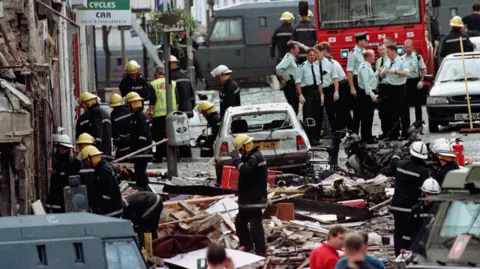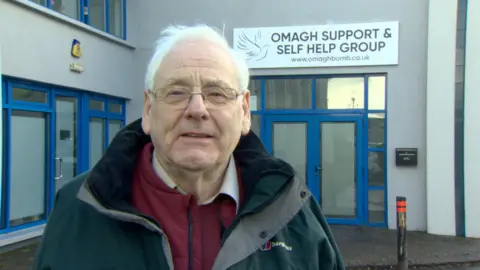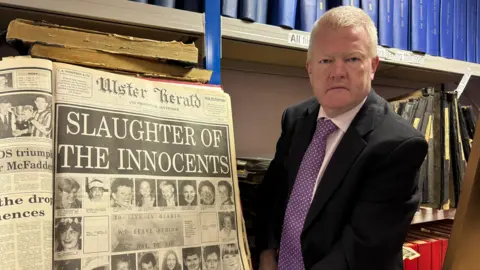Omagh bombing inquiry to start this week
 PA Media
PA MediaA man whose son was killed in the Omagh bombing says the public inquiry which gets under way this week will be "very difficult" but also "hugely important".
Michael Gallagher, whose son Aiden was killed, said he plans to attend "every single minute of every day" if he can.
The Omagh Bombing Inquiry will examine whether the worst atrocity of the Troubles could have been prevented.
Twenty-nine people, including a woman expecting twins, were murdered in the Real IRA attack on 15 August 1998.
Commemorative and personal statement hearings will take place at the Strule Arts Centre in Omagh from Tuesday and continue over the next four weeks.
Relatives will have the opportunity to speak or provide statements in memory of those who died.
People who were injured or witnessed the bombing and its aftermath can also share their experiences.
Mr Gallagher, along with some of the other victims' families, has fought a long legal battle for an inquiry to examine whether the bombing could have been prevented.

"It's going to be very difficult for the people who are the victims," Mr Gallagher told BBC News NI.
"But I think it's hugely important that it is happening because that's going to set the scene for the reasons why we really need a public inquiry.
"We had 31 beautiful, innocent people die, and I think it's important that they are acknowledged, and they are going to be acknowledged at the beginning of this inquiry.
"But I think the thing at the back of all of our minds is the people responsible for this horrendous, wicked, and evil atrocity will not be held to account, and that's the unfortunate thing," he added.
Part of the inquiry's remit will be to establish if security measures could have disrupted dissident activities in the run-up to the bombing.
It will also evaluate the intelligence picture.
But it is not its purpose to identify the individuals responsible.
The Omagh bombing inquiry held a preliminary session in July 2024 with its chairman, Lord Turnbull, promising it will undertake its task "rigorously and fearlessly".
'Everybody has a story to tell'

Alan Rodgers, a journalist with the Ulster Herald newspaper, believes the personal testimonies over the next four weeks will be the most powerful part of the inquiry.
He said the day of the bombing was traumatic, not only for the families of those who were killed and injured, but for the entire community.
"Everybody who was alive on that day has a story to tell about what they were doing and where they are," Mr Rodgers said.
"Over the course of the 26 years, those memories are still there, but they're kind of hidden.
"I think what will happen on Tuesday is that suddenly that will come back to the forefront, and from that point of view, I feel that it's going to be a very emotional and powerful occasion."

For the generation born since 1998, what happened in Omagh is a part of Northern Ireland's troubled history.
On the wall of Omagh High School is a memorial plaque to 5 former pupils who lost their lives.
Poppy, Connie, and Louise said the bombing of their town is something that is talked about in school and at home and continues to have a big impact.
Connie explains that her aunt was killed, "so it's always mentioned quite a lot in our house".
"It's probably, unfortunately, one of the things Omagh is well known for, so it's not really a good thing to be known for, but it's still there all the time.
"It's still such a big thing, no matter how long ago it was.
"It will always be a big event that shouldn't have happened and did happen, and it affected too many people because of it."
After decades of legal battles, there is a sense of anticipation and hope that the public inquiry will provide the answers that the families are seeking.
What was the 1998 Omagh bombing?
On 15 August 1998, just months after the signing of the Good Friday Agreement, a large car bomb exploded in the town's main street during peak Saturday shopping.
More than 200 people are injured in the blast, and a further 29 people died as a result.
Among the deceased were three generations of the same family.
The three women from Augher, County Tyrone, were a 65-year-old, her 30-year-old daughter, who was heavily pregnant, and her 18-month-old toddler.
Three days after the attack, the Real IRA claimed responsibility.
The recently formed dissident republic group said its targets were "commercial" and apologised to "civilian" victims.
No one has ever been convicted for the bombing; however, Real IRA leader Michael McKevitt was found responsible in a 2009 civil case.
Three other men, Liam Campbell, Colm Murphy, and Seamus Daly, were also found liable for the attack.
